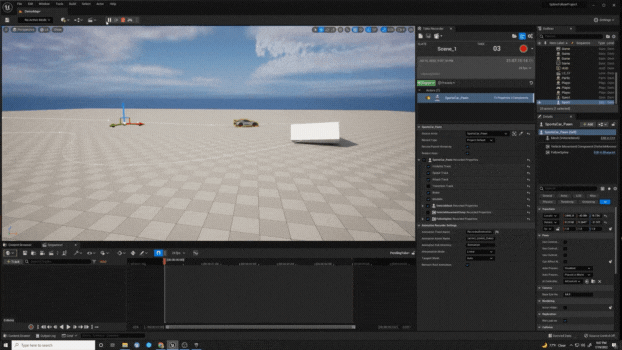As the director of film and media production in the School of Literature, Media, and Communication (LMC), John Thornton's job is to prepare students for what's next in the filmmaking world.
Thornton is an award-winning filmmaker and says success in the industry requires not just keeping up, but staying ahead. He shares his insights on shifting trends, game-changing projects, and the most impactful skills for students and aspiring filmmakers to develop today.
“Filmmaking is a way to understand more about people, about life, and about yourself. Making a movie and sharing it is a scary and very challenging endeavor, but it's one I would not trade for anything.”
So, What's Next in Filmmaking?
Thornton says there’s “definitely” going to be a shift toward more virtual production. In traditional filmmaking, traveling to different countries or locations means fluctuating production costs that can be hard to predict.
He said that using virtual tools to build the sets instead and filming with backgrounds projected on large LED screens can save time and money. Advances in artificial intelligence will only further this trend.
“The industry is leaning into artificial intelligence and how that's going to play a key role in the development of a lot of projects. Because the goal is to get the cost of the production down, but have the quality remain the same.”

Filming with LED screen backgrounds on Disney's The Mandalorian.
Image credit: starwars.com
How to Get Ahead
1. Learn virtual world-building.
First, he suggests learning virtual production tools, such as Unity, Unreal Engine, Maya, and Blender, to stay current.
“If you’re well versed in that space, then there's no limit to what you can do in film because you can make an entire movie on those platforms,” Thornton said. “You don't need cameras for a crew in the traditional sense because all of that stuff is available to you and online.These tools are lowering the barrier of entry into film and democratizing the filmmaking process.”
2. Focus On Storytelling
But for all the talk about emerging technology, one principle of filmmaking remains as important as ever: storytelling.
"In LMC, we train students to look ahead by staying informed about current trends, developing relevant skills, and emphasizing the importance of storytelling in their work." Thornton said.
“Even if you use a lot of high-end technology, that’s not going to help you separate yourself from what's already out there. What will help you is finding a way to tell a unique story that resonates with people.”
To improve your storytelling skills, Thornton recommends reading feature-length screenplays, going to the movies (in theaters!), joining filmmaking communities, and — perhaps most difficult of all — actually getting out there and creating.
“My biggest advice is to not just expect to learn everything about the industry in a class. You must get out into your local area, find out what's happening, and dive right in.”
3. Write Your Own Content
Writing your own films and creating your own content gives you much more power and control over the final product, Thornton said. He points to Shonda Rhimes, who “created an entire universe of shows” from a blank page.
“Just by sitting down and writing, that person became the showrunner on all those different shows,” Thornton said.
“So we're really trying to push students into that space and say, ‘Okay, how can we scale up this idea? How can we turn it into a series? How can we turn that series into multiple series? How can we do different spin-offs of this particular thing?’”

Sample animation tutorial in Unreal Engine
Game-Changing Projects
The Apple TV series The Mandalorian pushed boundaries when it was primarily created on a digital platform called Unreal Engine. Instead of filming on sets, the production team used virtual backgrounds displayed on large LED screens called “volumes.”
“Most of the sets weren't physical, and the way that they captured it started a shift in how people are approaching film now,” Thornton said. “And it's creating more, smaller shifts. People are saying, ‘Okay, that's too expensive, let's try this.’ Or, ‘This is too time-consuming; let's try this.’”
Thornton also suggests keeping an eye on the animation world. Because so many animated movies come out every year, practitioners in the medium are always trying new looks and techniques to stand out and get ahead, he said. Most recently, the Spider-Verse series changed how the format is viewed and made.
“It looked unlike any animation that's come out, and I don't think anyone can copy it,” Thornton said. “Animation is a trailblazer in a sense because it must continue to reinvent itself.”

Q&A With Bentley Heyman
Bentley Heyman is a producer, screenwriter, director and film lecturer in Georgia Tech’s School of Literature, Media, and Communication. He tells students not to feel pressured to adopt every new technology if it doesn’t resonate with them.
"Stay aware of innovations, and try them out when given the opportunity, but focus on and pursue the crafts and mediums that truly inspire you."
1. What's next for the future of filmmaking?
Technology will continue to advance — and fast. Ideally, this will make the industry more accessible by allowing filmmakers to leverage innovation to bring their stories to life more economically and efficiently.
While filmmakers will continue to lean on proven technologies and methods, they’ll also experiment with new exhibition formats like augmented reality, virtual reality, and immersive/interactive visual storytelling.
AI video creation is coming and will certainly impact production. Similar to advancements like green screens, blue screens, LED walls, motion capture, and visual effects, each filmmaker will need to decide for themselves how to use these new tools in their work.
A great film combines captivating imagery, immersive sounds, and magnetic performances to tell a compelling visual story. The future of filmmaking will be built on these same principles.
2. How can students keep up with industry changes?
Follow the trades and stay updated on industry innovations.
Seek out new technologies, explore their applications, and immerse yourself in their potential. With AI-generated video now a reality, it’s crucial to understand the technology’s potential contributions — both positive and negative.
Examine work exhibited in AR and VR and consider experimenting with your own creations. Imagine how these technologies can create meaningful experiences and tell powerful stories.
Attend workshops and conferences in your areas of interest.
Network with companies and individuals whose work you admire, and explore opportunities for collaboration.
Most importantly, know what you love. A film’s success relies on the collaboration of various artistic forms and skill sets. Traditional techniques will continue to hold significant power. Crafts like 2D animation and shooting on film will remain essential to great cinema.
 Filmmaking at Georgia Tech
Filmmaking at Georgia Tech
Buzz Studios is a student organization that creates about a dozen short films per year. They anyone who is interested in filmmaking to come to their monthly open production weekends and stress that no experience is necessary — you can learn on the job.
“We have a lot of different majors represented, a lot of people who had never even considered filmmaking as something they might want to do before they joined us,” said club president and computer engineering student Ethan Ollins.
“But they found that it was an outlet they enjoyed and there was something within it that spoke to them and they started to develop it as a skill.”
Image: Students working on a film with Buzz Studios
Thornton and Ida Yoshinaga, an assistant professor in LMC, run CinéInnovate Studios, a vertically integrated project with collaborators across campus. The team is creating an animated movie in Unreal Engine and documenting a roadmap for future filmmakers to follow in their footsteps.
More resources and events include:
- LMCFilms
- The Global Media Festival in the School of Modern Languages
- The Augmented Environment Lab
- LMC courses on topics such as video production, video editing and postproduction, and producing Black documentary film and podcasts
